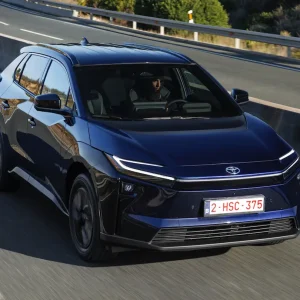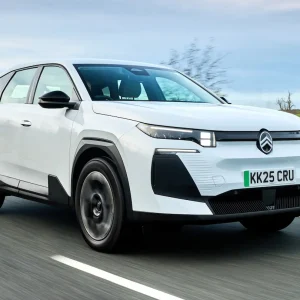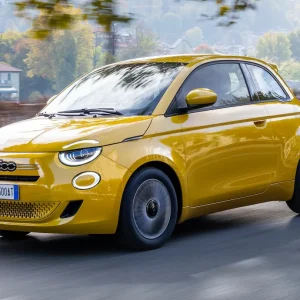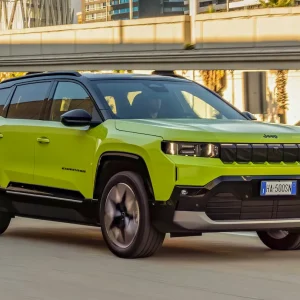Audi’s second plug-in hybrid model is a big one, in size terms at least, because after the A3 e-tron, the firm has now added the Q7 e-tron, a plug-in hybrid version of its biggest model.
The headline figures are a 48g/km CO2 emissions figure, an official battery-only range of 35 miles and a 0-62mph acceleration time of 6.2 seconds. oh, and a P11D price that’s just over £14,000 higher than
a regular diesel not kitted out with plug-in additions.

That neatly illustrates where this car is pitched – low emissions but plenty of performance, with the usual
plug-in hybrid caveat of it being a car that does its best work when not regularly exceeding the electric range between charges.
BIK considerations
One thing that is certainly worth noting is that upgrading to the optional 20-inch wheels increases the CO2 figure to 50g/km, which means a four BIK band jump equating to £87 per month for a higher tax payer.
It’s a shame there wasn’t a way to bring that down by a single gramme, given the huge financial penalty attached to the more aesthetically pleasing adornment.
The e-tron also suffers from not getting the seven-seat practicality offered to the rest of the range,
due to the housing of the batteries, while boot space drops from 770 litres to 650 litres for the plug-in for the same reason.

As the acceleration figure suggests, the Q7 e-tron carries its weight well in performance terms, and doesn’t feel nearly 400kg heaver than a diesel sibling. It enjoys all the lavish interior quality expected of a top-end Audi, refinement is good, and, in what Audi claims is a world first, waste heat from the battery powertrain is used to heat the cabin to increase efficiency. Electric-only mode is smooth and pleasantly responsive.
The brand predicts that a starting level of around 10% of Q7 sales will be the plug-in version, a figure that it expects to rise as the technology edges closer to the mainstream.
Whole-life costs
The costs case is an interesting one, because the whole-life costs versus a diesel Q7 can’t recover from the £14,000 price gap over a 272hp diesel S7 SE. Company car drivers make huge BIK savings thanks to the 23-band gap between the two cars, but the residual value of the diesel is 3.5 percentage points higher, which, even with fuel and NI savings for the company, still leave the e-tron trailing by 7.0p per mile.
Volvo’s XC90 T8 Twin Engine, the Audi’s main plug-in rival, is less than £400 cheaper and enjoys a much better RV, leaving it 7.6p per mile more cost-effective. That is, though, a petrol engine rather than the Q7’s diesel, so the efficiency once the battery is used up is greater on the Audi.

Mercedes and BMW also offer plug-in hybrid versions of the GLE and X5, respectively, but these aren’t in the same efficiency ball park at 78g/km and 84g/km, respectively.
The Q7 e-tron provides a genuine low-emission large SUV alternative. Although the Q7 styling isn’t the most exciting, the car itself is a clever piece of kit, but its suitability over a regular diesel Q7 depends entirely on whether it will be used for enough trips under 40 miles between charges to recoup that huge initial purchase cost.
Audi Q7 e-tron 3.0 TDI 258hp Quattro S-tronic |
| Model price range £48,255-£70,415 |
| Residual value 34.6% |
| Depreciation £42,420 |
| Fuel £1952 |
| Service, maintenance and repair £3407 |
| Vehicle Excise Duty £0 |
| National Insurance £2597 |
| Cost per mile 108.3p |
| Fuel consumption 156.9mpg |
| CO2 (BIK band) 48g/km (7%) |
| BIK 20/40% per month £76/£152 |
| Warranty 3yrs/60,000mls |
| Boot space (min/max) 650/1835 litres |
| Engine size/power 2967cc/258hp + 94hp electric moto |





